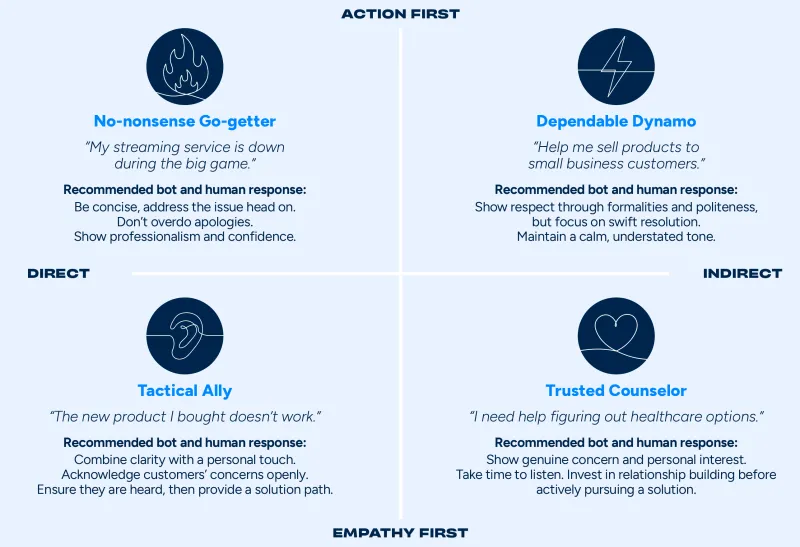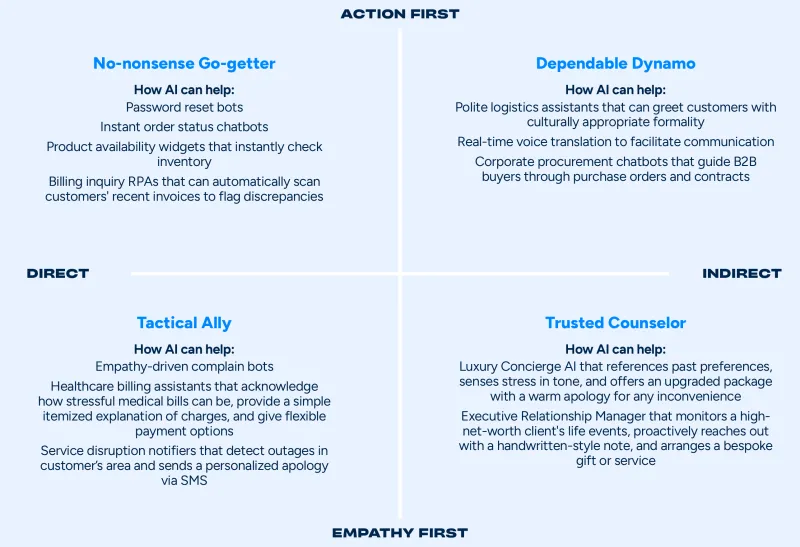Empathy has long been a cornerstone of contact center associate training. Conventional wisdom says customers want empathy when they reach out to a brand, especially if they’re frustrated or upset – and, for a while, the data backed up that premise.
But is it still true?
Recent research suggests customers don’t value empathy as much as we think they do. What customers want first and foremost, studies show, is action. They want their issue resolved; everything else is secondary. If empathy and apologies delay that resolution, they’re probably doing more harm than good.
Studies by Harvard Business Review and economists at Uber found:
- An apology that lasts longer than a few seconds reduces customer satisfaction
- When associates keep apologizing or trying to smooth things over, customers view it as a distraction
- Continuing to apologize beyond the first five to seven seconds of an interaction most likely has a negative effect and frustrates customers more
- Repeated apologies can be worse than no apology at all
Against this backdrop, it’s time to rethink empathy in the contact center and what role AI can and should be playing. Investments in training associates to be empathetic aren’t driving the ROI they used to.
While some interactions, including ones where customers enter particularly heated, still require an empathetic approach, most customers want action over apology.
AI is learning the language of empathy
The topic of empathy in the contact center takes on new relevance in the AI age. Conversation AI can help determine which types of interactions, intents, and customers call for empathy and which ones benefit most from an action-first approach.
The proliferation of autonomous AI agents also puts a spotlight on empathy in CX. Simple, menial tasks are increasingly deflected to AI agents that can quickly resolve inquiries without having to involve a human associate. This automation shortens wait times, improves first contact resolution, makes the contact center more efficient, and reduces costs – all while maintaining exceptional CX.
The benefits of AI are undeniable. But can it be empathetic?
Some foundational building blocks of empathy are there. Modern AI systems, especially those using large language models, can use sentiment analysis to interpret a speaker’s emotional state by analyzing word choice, tone, and context. “Empathic AI” bots can be programmed with context-aware responses and trained to reply with words or phrases that convey empathy, such as, “I’m really sorry you’re experiencing this.”
And AI doesn’t have “off” days or the type of personal biases human associates can bring. It can offer a consistent response, 24 hours a day and seven days a week.
AI might be better than humans at empathy because:
- It has unlimited patience and politeness. It doesn’t tire, become annoyed, or exhibit frustration the way humans can., which can create a sense of perceived empathy.
- It can draw on large amounts of contextual data instantly, including purchase history, past interactions, and emotional tone, to produce tailored responses that feel more empathetic.
- With advanced sentiment analysis, AI can adjust its tone and approach in real time, based on emotional cues or a sudden change in sentiment.
- AI can avoid some of the biases or judgments that humans may unknowingly bring. A person may discount an emotional reaction while an AI agent is programmed to respond empathetically regardless.
As AI-powered tools continue to evolve, brands might not need to rely as much on human associates to facilitate empathetic interactions.
But…AI’s empathy has ceiling
AI holds great potential but also has limitations when it comes to empathy. First, it lacks emotional depth. It doesn’t actually feel emotions and, though it might simulate empathy through carefully crafted responses, some customers may sense it’s formulaic or feel that the experience seems “off.”
And while AI lacks some preconceptions humans may bring, it doesn’t eliminate bias. AI is only as smart as the data feeding it and bias often creeps in along the way. Bias occurs when incomplete or skewed data is used to train AI models or applications. It can enter the equation at various points of the data process (collection, processing, and analysis) and skew the way AI “thinks.”
AI also lacks nuance. Human empathy can be extremely nuanced, especially when it comes to grief, trauma, or complex personal crises. AI’s responses might feel superficial and hurt relationships if it can’t understand the deeper context of customer interactions.
Brands also need to consider the ethical concerns of using AI for empathy. If AI appears too empathetic or manipulative, ethical questions can arise. Customers could be deceived into thinking they’re interacting with a human who truly cares, for example, when they are not.
Can AI deliver empathetic CX?
Given all its potential benefits and pitfalls, could AI be better at empathy than human associates? The answer is complicated.
In terms of consistent perceived empathy, AI has an advantage over people. AI can probably outperform an average or subpar human associate in purely perceptual empathy: using empathetic language and tone consistently, never losing its temper, and drawing on vast amounts of data for personalization.
But when it comes to forming a genuine connection, AI’s potential is more debatable.
In some cases, customers crave not just the words of empathy but the knowledge that another person truly understands and “feels for them.” In other cases, when an interaction is strictly about resolving a problem and feeling heard, many customers might not care as much (or at all) about authenticity if AI can provide a comforting, fast, and helpful response.
AI can help fill the empathy gap
As brands re-evaluate the role empathy plays in their contact center, AI is an important tool. But deciding where, when, and how to use AI is tricky.
When thinking about empathy, companies need to put their customers front and center. Decisions should be guided by the demographic being served. It’s important to consider customers’ cultures, for instance.
Some customers are from individualistic cultures that value direct communication, personal empowerment, and efficiency. They might appreciate empathy in some cases but what they really prioritize is fast, effective resolutions. Others are part of collectivist cultures that value maintaining social harmony, warm rapport, and respectfulness. With these customers, it’s critical to demonstrate empathy and politeness.
On top of gauging whether customers are part of an individualistic or collectivist culture, brands should also consider whether a culture values indirect (high-context) or direct (low-context) communication. Indirect cultures place more emphasis on nonverbal cues, implied respect, and avoiding confrontation, while direct cultures prefer clarity and straight-to-the-point directness.
At TTEC, we’ve examined how these differences – individualistic versus collectivist, and indirect versus direct – intersect and relate to each other and created the Empathy Engineering Matrix to help guide brands as they navigate AI’s role in empathetic CX.
The matrix plots various types of customers, contact center interactions, and intents into four quadrants:

Diving deeper, there are interactions within each of the matrix’s quadrants where AI can meet customers’ needs:

Empathy in CX is a strategic choice
Brands must consider many factors when determining how important empathy is to their CX and what role AI can reasonably play.
The notion that empathy is essential in all interactions is outdated. Most modern customers prefer action over empathy, and brands that continue to invest time and resources into delivering empathetic experiences may be severely missing the mark.
For interactions that do still require empathy, humans may not be essential. It’s time to explore where AI can help, especially in an uncertain economy where cost pressures are mounting. Don’t discount AI’s potential to be empathetic.
Challenging conventional wisdom, however, can be daunting. Working with a CX partner that has proven AI-powered solutions and CX expertise is a great way for brands to tap into the cutting-edge technologies, strategies, and best practices they need to thrive in the AI era.














